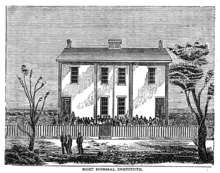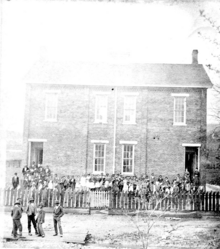| Central Alabama Institute | |
|---|---|
 Students c. 1910 Students c. 1910 | |
| Location | |
| Huntsville, Alabama, U.S. (1865–1904)
Mason City, Alabama, U.S. (1905–1922) | |
| Information | |
| Other name |
|
| Religious affiliation(s) | Methodist Episcopal |
| Established | 1865 |
| Founder | Pittsburg Aid Society, Rev. Madison C. B. Mason |
| Closed | 1922 |
| Affiliation | Freedmen's Aid Society |
Central Alabama Institute (1865 – 1922) was a private school for African American in Alabama, United States. The school was the city of Huntsville's first school for the African American community during the Reconstruction era. It was founded in 1865 in Huntsville, Alabama, and moved in 1904 to Mason City, near Birmingham, Alabama. The school also went by the names Rust Institute, Rust Normal Institute, Rust Biblical and Normal Institute, Central Alabama Academy, Central Alabama Institute and College, and Central Alabama College.
History



It was established under the name the Rust Institute, as a school to train African American teachers in Alabama in 1865. The Pittsburg Aid Society sent the earliest teachers to the school, and the following year in 1866 the Freedmen's Aid Society and the Methodist Episcopal Church took over the leadership. A two story brick building opened at the corner of Franklin Street and Townsend Avenue in Huntsville, Alabama in 1865.
It later changed the school name to Rust Normal Institute, followed by Rust Biblical and Normal Institute. From 1880 to 1881, the school had two instructors and 111 students, and was preparing to grow more. It became Central Alabama Academy in 1890.
In 1904 it moved to Mason City on the outskirts of Birmingham, Alabama, and reopened in 1905 as Central Alabama College. The Mason City location was founded by Rev. Madison C. B. Mason, working alongside the Freedmen's Aid Society, and the Methodist Episcopal Church. In 1922 its main building and other structures were struck by fire. It was not rebuilt or reopened. The Sherman Industrial Institute used a former Central Alabama Institute school building in Huntsville.
Jay Samuel Stowell wrote about the school in "Methodist Adventures in Negro Education" (1922).
Notable people
Mary Martha Lakin, the daughter of Arad Simon Lakin, served as a teacher at the school in 1868. Margaret Walker (née Alexander) was born on the campus in 1915, where her father Rev. Sigismund Walker taught.
Principals
- E. Miner
- G.M.P. King
- Mary L. Raines
- H. H. Sutton
Presidents
- Robert Nathaniel Brooks
- Isaac Newton Pailor, from 1875 to 1876
- William Laurene Riley, from 1900 to ?
- Alexander Priestly Camphor (A.P. Camphor); from 1908 to 1916
- J. B. F. Shaw, from 1916 to ?
Notable alumni
- Anna E. Cooper
- William Laurene Riley, class of 1886
References
- ^ Hubbs, G. Ward (2015-05-15). Searching for Freedom After the Civil War: Klansman, Carpetbagger, Scalawag, and Freedman. University of Alabama Press. pp. 191–192. ISBN 978-0-8173-1860-4.
- ^ "President W. L. Riley". The Journal. 1900-12-28. p. 2. Retrieved 2024-07-25 – via Newspapers.com.
- ^ Fallin, Wilson Jr. (September 6, 2017). The African American Church in Birmingham, Alabama, 1815-1963: A Shelter in the Storm. Routledge. ISBN 9781351629287 – via Google Books.
- Murphy, Larry G.; Melton, J. Gordon; Ward, Gary L. (November 20, 2013). Encyclopedia of African American Religions. Routledge. ISBN 9781135513382 – via Google Books.
- Kiddle, Henry; Schem, Alexander Jacob (1876). The Cyclopædia of Education: A Dictionary of Information for the Use of Teachers, School Officers, Parents, and Others. E. Steiger. p. 810.
- ^ United States Bureau of Education (1886). Report of the Commissioner of Education Made to the Secretary of the Interior for the Year ... with Accompanying Papers. U.S. Government Printing Office. p. 409.
- ^ Freedmen's Aid Society (1878). Annual Report of the Freedmen's Aid Society of the Methodist Episcopal Church. Western Methodist Book Concern Press. p. 30.
- United States Bureau of Education (June 25, 1884). "Report of the Commissioner of Education Made to the Secretary of the Interior for the Year ... with Accompanying Papers". U.S. Government Printing Office. p. 7 – via Google Books.
- ^ Hartshorn, William Newton; Penniman, George W., eds. (1910). An Era of Progress and Promise: 1863-1910 (PDF). Boston, Massachusetts: The Priscilla Publishing Co. p. 195.
- Judd, Charles Hubbard; Eliot, Charles William; Williams, J. Harold; Hoke, Kremer Jacob; Education, United States Office of; Larson, Walter E.; Ryan, Will Carson; Nelson, Ernesto; Parker, Samuel Chester (1917). "Sherman Industrial Institute". State Higher Educational Institutions of Iowa: A Report to the Iowa State Board of Education of a Survey Made Under the Direction of the Commissioner of Education. U.S. Government Printing Office. p. 102 – via Google Books.
- "Jay S. Stowell (Jay Samuel), 1883-1966. Methodist Adventures in Negro Education".
- Harris, Paul William (2022-02-25). A Long Reconstruction: Racial Caste and Reconciliation in the Methodist Episcopal Church. Oxford University Press. pp. 52–53. ISBN 978-0-19-757184-2.
- "Research Guides: Black Women Oral History Project Interviews, 1976–1981: Biographies".
- The Methodist Almanac. G. Lane. 1872. p. 57.
- "Brooks, Robert Nathaniel". NCpedia.org. Retrieved 2024-07-25.
- Herringshaw, Thomas William (1914). Herringshaw's National Library of American Biography. American publishers' association. p. 363.
- "Noted Negro Bishop Dies in Jersey Home". Star-Gazette. 1919-12-12. p. 25. Retrieved 2024-07-25 – via Newspapers.com.
- "Clipped From The Montgomery Advertiser". The Montgomery Advertiser. August 18, 1916. p. 5 – via newspapers.com.
- Baker, Webster B. (June 25, 1924). "History of Rust College". The Author – via Google Books.
- 1872 establishments in Alabama
- 1922 disestablishments in Alabama
- African-American history in Birmingham, Alabama
- Buildings and structures in Huntsville, Alabama
- Educational institutions established in 1872
- Educational institutions disestablished in 1922
- Education in Huntsville, Alabama
- Schools in Birmingham, Alabama
- Universities and colleges affiliated with the Methodist Episcopal Church
- Historically segregated African-American schools in Alabama
- Defunct schools in Alabama